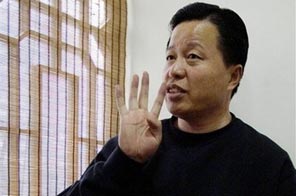1 year on, China stays silent on missing lawyer
BEIJING: One of China's most daring activist lawyers disappeared a year ago Thursday, and the government that so closely monitored him has not explained where he is, infuriating even those used to Beijing's indifference to outside pressure on human rights.
High-profile dissidents have disappeared in China before, but not for so long without details from authorities. Family and friends have no idea whether Gao Zhisheng, who had been under strict police surveillance, is even in custody.
Officials have been teasingly vague, with a policeman telling Gao Zhiyi his brother "went missing" and a Foreign Ministry official last month saying the self-taught lawyer "is where he should be." As is typical in China, state-run media have not mentioned the case.
"Why are you in such a hurry? Just wait," police told Zhiyi a few days ago, then hung up, Gao's wife said Wednesday night.
China's surprisingly casual response to a high-profile case raised repeatedly by U.S. officials, the United Nations and rights groups is a troubling sign of the country's overall hardening stance on a wide range of issues, experts said. They pointed to ever-tightening Internet controls, last month's execution of a British man with reported mental problems and the unprecedented threat of sanctions against companies involved in a planned U.S. arms sale to Taiwan.
"All things combined contribute to the sense that things are deteriorating," said Joshua Rosenzweig, research manager for the U.S.-based Dui Hua Foundation, which has been seeking Gao's whereabouts.
The group has had some past success in negotiating the freedom of Chinese political prisoners, but in Gao's case the information has run dry. The group last heard from officials in November, when it was told Gao wasn't in custody.
A U.S. Embassy spokeswoman said Wednesday the government is "deeply concerned" about Gao's safety. "We have raised our concerns about Mr. Gao's well-being and whereabouts repeatedly, both in Washington and in Beijing," said Susan Stevenson. She said she couldn't talk about the details of diplomatic exchanges, including China's response.
Repeated phone calls and faxes to Beijing police asking for information about Gao have been ignored. Visits this week to Beijing's high court turned up nothing.
The scattered responses from officials have made Gao's friends and supporters even more worried about the forceful but charming man who took on extremely sensitive cases involving underground Christians and the banned Falun Gong spiritual group, and faced intense police harassment in return.
In a written statement made public just before he disappeared last year, Gao described severe beatings from Chinese security forces, electric shocks to his genitals and cigarettes held to his eyes during a 2007 detention.
"Your death is sure if you share this with the outside world," one of his jailers warned him, Gao wrote.
Some supporters fear the worst. "I think at this point, most of us probably would settle for knowing he's alive and well," Rosenzweig said Wednesday.
Supporters planned to mark Gao's one-year disappearance Thursday. The China Human Rights Lawyers Concern Group and others said they would demonstrate in Hong Kong. Rights group Freedom Now planned to file a legal petition in Geneva with the U.N., asking it to put pressure on China to say where Gao is.
Gao's wife, Geng He, wrote in op-ed article in The Washington Post on Thursday that the United States should speak up more for dissidents in China. "It's true that Beijing is silencing more political dissidents than ever. But this is a call to action, not a reason to stand idly by," she said.
Geng said she was "certain that my husband is being tortured and wondering whether I should actually hope that he has already been killed."
Even those accustomed to China's treatment of rights cases have grown exasperated with the government's response to Gao's case.
"The charade goes on," Jerome Cohen, an expert on China's legal system at New York University School of Law, said after the Foreign Ministry's comments last month.
The outspoken, rough-edged Gao was once so successful that China's Justice Ministry named him one of the country's top 10 lawyers in 2001 for his work in property rights. But then he pushed too far for officials' comfort.
He began to take on highly sensitive cases and eventually spoke out for constitutional reforms.
Like many of China's activist lawyers, he insisted that he was only pushing Beijing to follow and respect its own laws.
He was arrested in August 2006, convicted at a one-day trial and placed under house arrest. State media at the time said he was accused of subversion on the basis of nine articles posted on foreign Web sites.
Meanwhile, the constant police surveillance wore on his wife and children. They finally fled China a month before Gao disappeared and were accepted by the United States as refugees.
Geng didn't say goodbye to her husband, who wasn't at home at the time. She left him a note, apologizing.
The family's modest apartment in northern Beijing remains unoccupied. Neighbors said Wednesday the family was now in the United States.
They assume Gao is with them.






